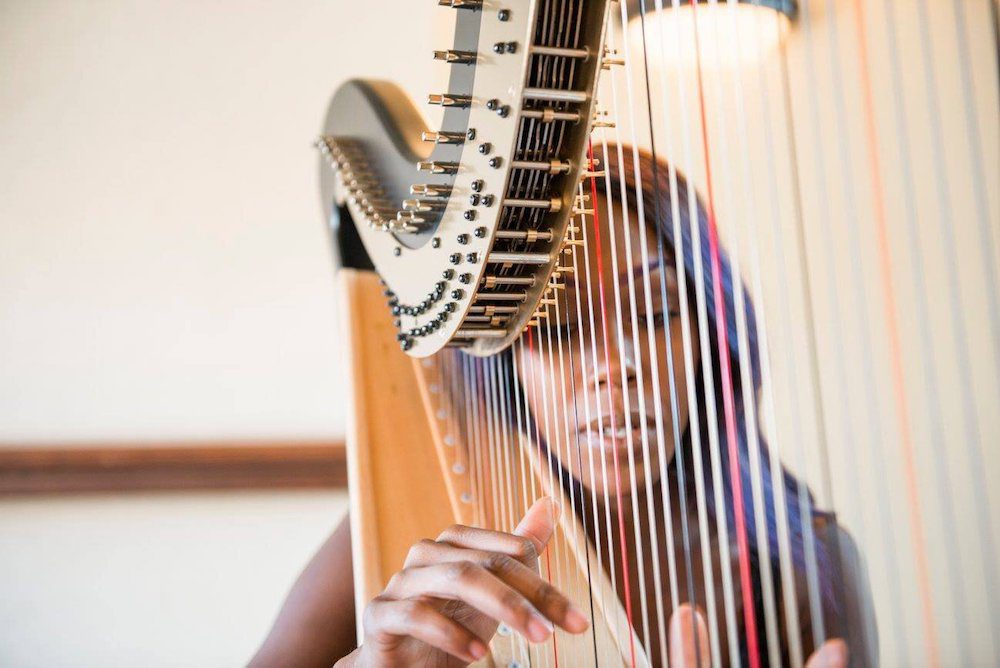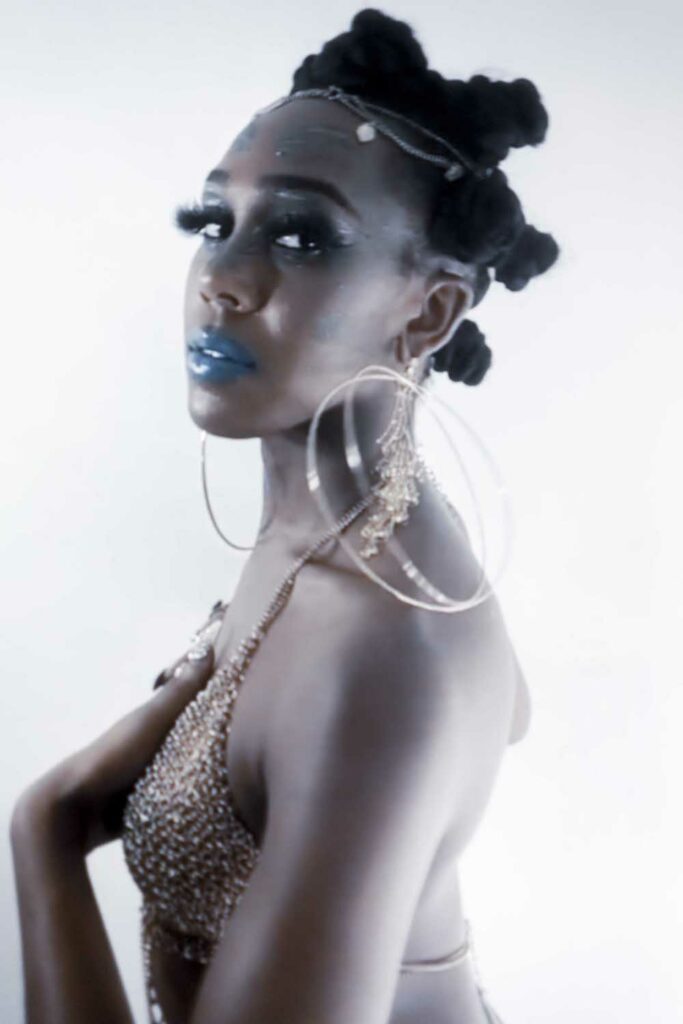

Ahya Simone had no intention of being a harpist. From the minute her high school counselor added the novel elective to her schedule in ninth grade, she wanted nothing to do with the class or the instrument. But, like many impactful experiences in her life, this opportunity that seemingly fell into her lap became one of the most important aspects of her life. “I always say that some of the greatest things or the most pivotal things in my life happen to me through things that I didn’t even necessarily set out to do,” says Simone. “And how I got into the harp was one of those things.”
Though Simone grew up in the Baptist church where she nurtured her love of singing, the Detroit born-and-bred harpist, singer and filmmaker says the harp changed her life in ways she could have never anticipated. She explains that learning the harp was an integral part of embracing and understanding her femininity. As a self-described “5’4″ cunty little gender expansive child,” Simone admits that she was hesitant to embrace the harp at first because of its association to femininity. “It’s like the thing that people do when they’re so obsessed with something, but then they’re like, “I’m gonna be the total opposite of that.”
But come the end of the semester, Simone was the star pupil of her class and was encouraged by her teacher to continue. Besides giving her a creative outlet and a chance to learn how to read music, the harp acted as a safe space for Simone to access her femme side. “It was a way for me to be feminine in public space in a way that felt safer than trying to outwardly express femininity in ways like dressing in feminine clothes – it was more so a caveat to my actual transition,” says Simone. “Honestly, it was lifesaving to me, just like transitioning was life saving to me. I probably wouldn’t have transitioned when I did if I didn’t play the harp.”
Simone continued to excel at the harp, which led her to continue her studies at Detroit’s Wayne State University. And while her relationship with the harp grew, she felt stifled by the confines of the orchestra pit. As someone who grew up with a love of singing and listening to Earth, Wind and Fire, Anita Baker and Beyoncé, there was a part of Simone’s artistry that was waiting to be tapped into. “I had to play… 300 year old dead people music in a goddamn pit and I was like ‘Oh my god I can’t do this anymore,’” Simone remembers. “I can’t sit in this pit with all these white people that don’t understand me and I’m the only harpist.” So, by the time graduation came around, Simone decided she wouldn’t waste her time clawing her way to the rare harp chair in an orchestra. She would take her own path, one that paid homage to the R&B and electronic music that raised her and the groundbreaking jazz harpists that paved the way for her.

“I am so floored at how underrated Dorothy Ashby is and how many jazz greats have no idea who Dorothy Ashby is,” says Simone of one of her greatest influences. She explains how discovering jazz harpists like Dorothy Ashby, Alice Coltrane and her teacher Brandee Younger has expanded her theoretical knowledge of the harp. Aside from inspiring her to delve deeper into her improvisational impulses, these artists reaffirmed Simone’s belief that the harp was not only destined for those content to play Tchaikovsky’s “Waltz of the Flowers” for the rest of their lives.
“Western thought and culture kind of siphoned off the cultural vastness of what the harp represents,” says Simone. “Because now, it’s associated with like, delicate white women. And, you know, I’m not a delicate white woman… But one thing I do feel like it represented to me was a sense of boldness, a sense of elegance that I had hoped to embody as a young person. And also it was cool. It wasn’t the violin, it wasn’t the piano. Pianists were a dime a dozen. But the harp was just like – this is some bad bitch shit actually.”
Since being cajoled into trying the harp her freshman year, Simone has forged her own path as a musician, ranging from being the Principal Harpist for the Wayne State University Symphony to collaborating with electro R&B artist Kelela, scoring Louis Vuitton’s Fall/Winter 2021/2022 digital runway show, and releasing a video for her debut single “Frostbite” in October 2020.
She’s also written and starred in the critically acclaimed web series Femme Queen Chronicles – the story of four Black trans women navigating life in Detroit. Much like Simone’s experience with the harp, her foray into filmmaking happened organically and unexpectedly, as a result of an impromptu meeting with friends at KFC.
In 2017, Simone attended a community meeting with other trans women to address the acts of violence that were affecting trans women of color in Detroit. After what was understatedly an extremely heavy couple of hours, Simone and a few of her friends decided to go get some food and decompress. “One of my co-creators wanted KFC and everyone else wanted Wendy’s, so of course we went to KFC because she wanted some potato wedges,” Simone says. “We were just talking shit, talking about growing up Black and trans in Detroit…and, like, I just pulled over from laughing so hard about our funny ass stories. I was like, this is what I wanna see on my screen… something quirky and funny and joyous… that’s not always at the expense of trans women in front of these cis audiences.” And just like that, Femme Queen Chronicles was born.
Simone’s intrinsic musicality permeates the cadence of FQC’s first episode, “The Clock.” “If you notice… it’s very rhythmic,” Simone explains. “It’s almost like a jazz song. It’s just this really dope rhyme. It has a beat to it, a pacing that felt really musical to me.” With just this first episode out, FQC has already garnered recognition from Blackstar Film Festival, the Sundance Institute, Cinetopia Film Festival and more. The series is an amalgamation of lived experience blended with nostalgic sitcom inspiration. “It’s kind of like, Chewing Gum meets Living Single,” says Simone. “It’s like, weird, quirky comedy with Black trans women from Detroit.”
Created by Simone and her friends Paige Wood and Bre Campbell, the first ten minute episode proved to be a daunting task for such a small team. “I think it all came together really well even though I was kicking and screaming and crying the whole way through,” says Simone. “It took six months from the idea to writing the script to shooting and editing and doing the music. It was crazy. It was just buck wild.”
Though the team had a small budget for the first episode, they’ve been in an incubation period for the last few years, trying to raise enough funds to continue the series. Aside from production costs, Simone and her team have implemented an impact plan that ensures anyone involved in the production has access to emergency funds, as well as hiring trans interns to assist on set. And while the team has been in talks with production companies and networks about future partnerships, there’s still a lot of work to do in terms of developing Season One. “In 2019, we did a nearly all Black, trans writers room,” says Simone. “We didn’t get to finish, but we managed to get some very fleshed out episodic outlines… So any support monetarily that could support us in being able to sit our ass at home and actually write the script [would be helpful].” FQC accepts donations on an ongoing basis via CashApp.
It’s clear that whatever the next steps are for Simone and Femme Queen Chronicles are, they will be on her terms and rooted in bolstering her community.
Follow Ahya Simone on Instagram for ongoing updates.

